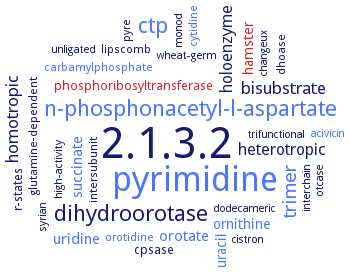2.1.3.2: aspartate carbamoyltransferase
This is an abbreviated version!
For detailed information about aspartate carbamoyltransferase, go to the full flat file.

Word Map on EC 2.1.3.2 
-
2.1.3.2
-
pyrimidine
-
dihydroorotase
-
ctp
-
n-phosphonacetyl-l-aspartate
-
trimer
-
homotropic
-
bisubstrate
-
heterotropic
-
holoenzyme
-
succinate
-
orotate
-
uridine
-
ornithine
-
hamster
-
uracil
-
r-states
-
cpsase
-
phosphoribosyltransferase
-
glutamine-dependent
-
carbamylphosphate
-
dhoase
-
cytidine
-
orotidine
-
lipscomb
-
intersubunit
-
changeux
-
pyre
-
otcase
-
syrian
-
acivicin
-
high-activity
-
wheat-germ
-
cistron
-
unligated
-
monod
-
trifunctional
-
interchain
-
dodecameric
- 2.1.3.2
- pyrimidine
- dihydroorotase
- ctp
- n-phosphonacetyl-l-aspartate
- trimer
-
homotropic
-
bisubstrate
-
heterotropic
-
holoenzyme
- succinate
- orotate
- uridine
- ornithine
- hamster
- uracil
-
r-states
- cpsase
- phosphoribosyltransferase
-
glutamine-dependent
- carbamylphosphate
- dhoase
- cytidine
- orotidine
-
lipscomb
-
intersubunit
-
changeux
-
pyre
- otcase
-
syrian
- acivicin
-
high-activity
-
wheat-germ
-
cistron
-
unligated
-
monod
-
trifunctional
-
interchain
-
dodecameric
Reaction
Synonyms
(S)-2-methyl-3-oxopropanoyl-CoA:pyruvate carboxyltransferase, ACT, aspartate carbamoyltransferase, aspartate carbamyltransferase, aspartate trans carbamoylase, aspartate transcarbamoylase, aspartate transcarbamylase, aspartic acid transcarbamoylase, aspartic carbamyltransferase, aspartic transcarbamylase, ATC, ATC domain of CAD, ATCase, CAD, carbamoylaspartotranskinase, carbamoyltransferase, aspartate, carbamylaspartotranskinase, L-aspartate transcarbamoylase, L-aspartate transcarbamylase, MJ1581, PYRB
ECTree
Advanced search results
Temperature Stability
Temperature Stability on EC 2.1.3.2 - aspartate carbamoyltransferase
Please wait a moment until all data is loaded. This message will disappear when all data is loaded.
100
-
30 min, stable in solutes, but loss of 41% of secondary structure in absence of solutes, the loss is enhanced in presence of KCl, NaCl, or K+-glutamate, glycine and sucrose are thermoprotective
45
55 - 65
-
4 min, loss of 70% of secondary structure in absence of solutes, Tm is highly enhanced in presence of KCl, NaCl, or alpha and beta isomers of K+-glutamate, NaCl, KCl, glycine, and betaine are not thermoprotective, but trehalose, sucrose, and K+-glutamate are, K+-glutamate raises Tm and maintains enzyme activity, overview
60
65
75
90
95
-
30 min, stable in solutes, but large loss of secondary structure in absence of solutes, the loss is enhanced in presence of KCl, NaCl, or K+-glutamate, glycine and sucrose are thermoprotective
98
additional information
-
carboxylic acids e.g. acetic acid, citric acid and high ionic strength, 200 mM KCl, protect against thermal denaturation at 65-70°C
-
melting temperature, catalytic subunit, presence of carbamoyl phosphate
90
catalytic subunit, half-life: 80 min, half-life of holenzyme: 240 min
90
native and recombinant enzyme, loss of less than 10% activity after 40 min
half-life of the holoenzyme is 2.5 times higher than that of the catalytic subunit


 results (
results ( results (
results ( top
top






